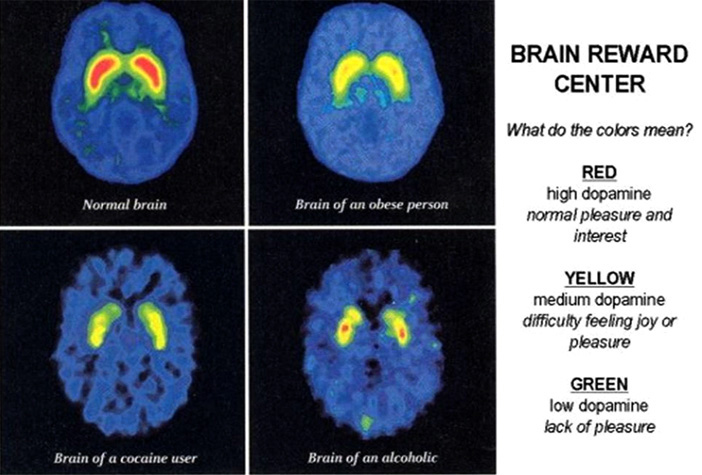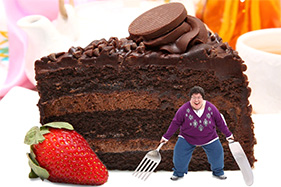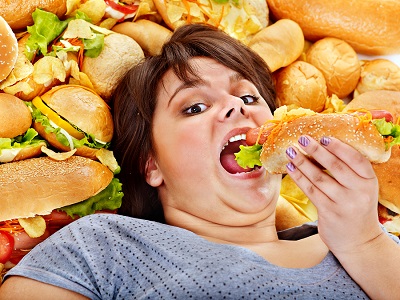The Food Addict's Brain
-
The Food Addict's Brain is Different

There is a real difference between a Food Addict's brain and that of a Naturally Thin Woman!
Some signs of weight issues include obsession over food, compulsive eating, needing to eat in large quantity to feel full, frequent hunger, strong response to food cues and brain hunger. The conclusive indicator of food addiction is the repetitive inability to eat in a "normal" manner despite numerous attempts to end compulsive overeating.
To explain the difference between a Food Addict's brain and a Naturally Thin Woman's brain, we look to images produced by a functional Magnetic Resonance Imaging Machine (fMRI). This advanced technology produces an image of the brain and sheds light on brain activity that occurs during specific events such as eating delicious foods. "It is similar to working out," Ashley Gearhardt, Ph.D., explains. "When you are working a certain muscle, blood rushes to that area. The brain appears to work the same way, and we can track what brain regions are receiving the most blood."
There is a specific brain region known as the prefrontal cortex that, when observed in an fMRI, is particularly demonstrative of how an individual responds to sensory cues. In a study, Dr. Gearhardt presented normal-weight and obese subjects with color photographs of foods varying in fat-content and calorie-density while they underwent fMRI testing. The results showed that food addicted brains responded to the fattier and more calorie heavy options in the same way that drug addicts' brains respond to drugs!
As the fMRI images show, the pleasure center of the obese person shows more similarity to the cocaine user and alcoholic than to the brain of a person with no addiction. Ultimately, in the case of an addict, it takes more of the addictive substance to achieve adequate feelings of pleasure from dopamine which leads to overconsumption that non-addicts do not feel is necessary.
When exposed to tempting but unhealthy food, a Food Addict experiences less satisfaction which is demonstrated by a lesser level of dopamine produced in the fMRI. To compensate for this lack of dopamine, which really means lack of pleasure, Food Addicts consume more flavor-enhanced foods to achieve the same contentment from eating that a normal person would experience without the extra calories. Believe it or not, this is also exactly how it works for drug addicts and alcoholics!
 Another key sign of an addict is the craving for their addictive substance or need for a "fix". A food fix, like any drug fix, is an attempt to experience the dopamine high needed by any addict. In the 1954 study credited with the identification of the pleasure center two researchers at McGill University, James Olds, Ph.D., and Peter Milner, Ph.D., documented the effect of dopamine. In this study, rats could push a bar to have their pleasure center electrically stimulated or they could push a bar for food. Drs. Olds and Milner documented that, for the rats, electrical stimulation of the pleasure center was more rewarding than food. In fact, the experience was so rewarding that a starving rat would ignore food in favor of the pleasure that stimulating her pleasure center electrically gave her. Some rats stimulated their brains more than 2,000 times per hour for twenty-four consecutive hours! In fact, most of the rats died of starvation.
Another key sign of an addict is the craving for their addictive substance or need for a "fix". A food fix, like any drug fix, is an attempt to experience the dopamine high needed by any addict. In the 1954 study credited with the identification of the pleasure center two researchers at McGill University, James Olds, Ph.D., and Peter Milner, Ph.D., documented the effect of dopamine. In this study, rats could push a bar to have their pleasure center electrically stimulated or they could push a bar for food. Drs. Olds and Milner documented that, for the rats, electrical stimulation of the pleasure center was more rewarding than food. In fact, the experience was so rewarding that a starving rat would ignore food in favor of the pleasure that stimulating her pleasure center electrically gave her. Some rats stimulated their brains more than 2,000 times per hour for twenty-four consecutive hours! In fact, most of the rats died of starvation.
Many serious drug addicts forget to eat and shed weight, similar to the rats in the aforementioned study. This explains why, when we are getting our dopamine fix from other sources including first stages of love and other enjoyable activities like dancing, singing and soulful conversation, we are less likely to overeat and may even completely forget to eat! The addiction is not to the food. The addiction is to a dopamine high. When that mechanism is faulty, we become food obsessed and overeat in an attempt to get our dopamine fix. -
Food Obsession

Like many addicts, food had overwhelming power over me that made it impossible to turn down an enticing piece of chocolate cake, fall asleep with a food craving or sit down to a meal and not want to eat the leftovers at the table. I needed a dopamine fix and the food was calling to out to me, ready to be the vehicle for delivering pleasure to my brain.
You may find these examples all too familiar! You are not alone. As Food Addicts, we all obsess about food and eat compulsively. We eat voraciously and, when we aren't eating, we crave food incessantly.
Dr. Gearhardt conducted neurobiological studies where she documented the similarities in the way the brain responds to drugs and highly palatable foods. Like drug addicts, people with food addiction struggle with increased cravings and stronger urges to eat in response to food cues and may feel more out-of-control when eating something delicious. Even a single morsel of a cookie can trigger a binge, much as a single drink can send an alcoholic on a bender. "The findings of this study support the theory that compulsive eating may be driven in part by an enhanced anticipation of food rewards," Dr. Gearhardt stated. In response to the anticipated receipt of food, participants with higher food addiction scores showed greater activity in parts of the brain responsible for cravings and the motivation to eat, but less activity in the regions responsible for inhibiting urges during consumption. -
Compulsive Eating

When I gave away my large clothes I noticed something very significant: Not one of them was stain-free! Every single blouse or dress top was splattered with an oil stain or a sauce stain or some other type of food - every single one of them! Eating was a frenzy. I ate with the voracity of a piranha; eating was attempting to get a food fix as quickly as humanly possible.
My story is not unique. Most overeaters exhibit a level of anxiety that doesn't allow eating in a calm or mindful manner. Because our brains are off the tracks and out of control, biologically speaking, eating becomes a completely compulsive event!
There is a part in the brain called the ventral striatum which is best known for its role in the planning and modulation of movement pathways. However, it is also involved in a variety of other cognitive processes such as working memory. In humans, the striatum is activated by stimuli associated with reward, but also by aversive, novel, unexpected, or intense stimuli, and cues associated with such events. If you think of the brain as a train, then the ventral striatum is the accelerator. When food enters a person's body it stimulates the pleasure center, and the pleasure center in turn increases the flow of dopamine.
When you overeat regularly, there are multiple effects. Your reward system is hijacked, there are neuroplastic changes and the neurotransmitters of serotonin and GABA (inhibitors) involved in the "braking system" are decreased. Basically, food addiction derails your pleasure center in the brain. It becomes all accelerator and no brakes. Just like when a train's brakes fail, we end up with a runaway train that eventually falls off the tracks! -
Drug Tolerance and Why We Overeat

We need to eat! Humans are biologically required to do so which is the reason we are set up to feel pleasure through food in the first place. When we enjoy a delicious meal or snack, we do so because our body knows it causes our brain to produce dopamine. However, addicts need more and more of what they're addicted to for their body to produce the amount of dopamine they desire.
Alcoholics drink many under the table, drug addicts use larger quantities of drugs and food addicts out eat most of their non-addict friends! There is a tolerance that builds up with addiction, meaning a continually larger amount of the addictive substance is required to create a dopamine high each time. For Food Addicts, it is no different - more and more food is necessary in order to produce an adequate dopamine high or food "fix."
Another excellent example of tolerance from addiction that I found throughout my research is that of men addicted to web pornography. Once a man is fully addicted to this form of a dopamine fix, they report that they cannot feel excited or satisfied during intercourse with a real woman. It takes them months of abstaining from X-rated sites and withstanding intensive withdrawal symptoms before they can regain the experience of pleasure when interacting with an actual woman.
Now that we understand why we must overeat to experience the same amount of dopamine as our naturally thin counterparts, let's refer back to the fMRI images discussed earlier.
Dopamine levels are demonstrated in the brain scan using colors: red indicates a high level, yellow a medium level and green a low level. The higher the level of dopamine, the more intense the associated pleasure is. The obese person's brain scan reveals a medium dopamine level, signifying that they experience less pleasure than the normal weight or naturally thin person when eating the same food. Therefore, despite the popular misconception that obese people love and get greater joy from food, the truth is that the more severe the food addiction, the less pleasure the food addict experiences when eating.
This explains why we act irrationally whenever we are not reaching the food level that triggers the generation of enough dopamine to experience pleasure. -
Intense Response to Food Cues

Food Addicts experience overwhelming cravings and hunger in the presence of food cues such as tempting smells or visuals. Researchers call this phenomenon "external food sensitivity." According to Yale's Dr. Gearhardt, “Addicted individuals are more likely to be physiologically, psychologically, and behaviorally reactive to triggers such as advertising. The possibility that food-related cues may trigger pathological reactions is of special concern in the current food environment, where highly palatable foods are constantly available and heavily marketed." Food Addict, just like drug addicts, struggle with these cravings that result from food cues and are often unable to fight their urges. Meanwhile, this is a foreign concept to the Naturally Thin Woman.
-
Emotional Imbalance Causes Hunger

As a positive person, my strongest allergy is to anything that compromises my optimistic outlook. I automatically utilized food as a form of stress relief, as an escape from uncomfortable feelings or challenging situations and to cope with difficult people or life's adversities.
When we are addicted to food, our brains are programmed to use food to temporarily eliminate anxiety, irritability, stress, depression, excitability and any uncomfortable feelings with a dopamine fix. The more we associate our addictive substance with feeling better, the more we rely on it to be happy. It becomes a coping mechanism for life's challenges, resulting in constant overeating episodes. -
Measurable Brain Differences
Extensive research has substantiated that the brain activity of compulsive overeaters is unequivocally similar to that of drug and alcohol addicts. Furthermore, the studies that demonstrate a statistical difference between the brains of obese and lean individuals are irrefutable. There is a concretely proven difference between the brains of addicts and non-addicts, and food addiction is without a doubt a real and serious addiction.
In 2009, Dr. Gearhardt led a team at the Rudd Center for Food Policy and Obesity at Yale University where she developed the Yale Food Addiction Scale. The scale is a tool to identify those who are most likely to be exhibiting markers of substance dependence with the consumption of high fat/high sugar foods. The scale's questions fall under specific criteria that resemble the symptoms for substance dependence as stated in the Diagnostic and Statistical Manual of Mental Disorders. Dr. Gearhardt found that overweight participants who had higher food addiction scores showed different brain activity patterns than those with lower scores. Specifically, in response to the anticipated receipt of food, participants with higher food addiction scores showed greater activity in parts of the brain responsible for cravings and the motivation to eat, but less activity in the regions responsible for inhibiting urges during consumption. -
Why Do We Return to Our Old Eating Habits

Once we are Food Addicts, any prompts such as emotional imbalances, challenges or tempting smells and visuals will automatically induce us to seek relief through food. What addicts call "triggers" scientists refer to as "cues," or powerful emotional memories.
Nora Volkow, M.D., Director of the National Institute on Drug Abuse, performed brain scans of cocaine addicts while watching two videos: one of nature scenes, the other of people using cocaine. She found that dopamine increased in response to the drug-taking scenes in proportion to the subjective reporting of craving by the addicts. This illustrates the power of drug-taking cues and how they work unconsciously. Dr. Volkow says, "For these people, their lives and experiences have taught them that when they see others using cocaine, they're probably about to get rewarded with drugs too. So even though they consciously knew they weren't going to get cocaine after watching the video, their brains had learned to expect the reward." Cue-related relapse is tied to longer-lasting brain changes than were originally thought. For example, the hyperactivity of neurotransmitters associated with alcohol withdrawal can last as long as a year.
Scientists suggest that relapse frequently happens because the spike in dopamine in the addict's brain is experienced in the Limbic "reward" system. When the food addict sees a delicious cue, it overpowers the planning and decision-making portion of the brain, the prefrontal cortex, where rational decision-making takes place.
As with all addicts, a food addict's motivation is biased to the short-term emotional pleasure. This is something we have all experienced. It is undeniable that the short-term relief that a quick binge provides defeats our willpower when trying to stay on a diet. All it takes is one enticing cue to send our brains on a downward spiral towards compulsive eating. These cues sneak up on us and without even thinking about it, we eat and unconsciously send ourselves into a relapse.